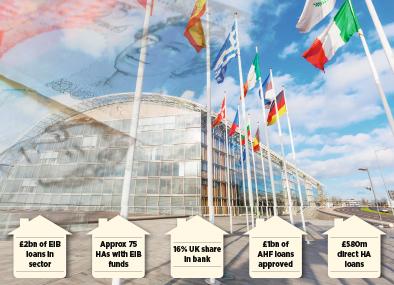‘Project Fear’ to ‘Project Farce’: a snapshot of where we’re heading
HAs sit at the junction of many key issues exposed by ‘Brexit’.
For David Cameron as the mastermind of the Brexit referendum, it looks like he has created his very own equivalent of Anthony Eden and the Suez Crisis.
Alongside 9/11 and the Lehman Brothers collapse, 24 June 2016 will be a stand-out day in my life.
This time, the issues raised are arguably even more multi-dimensional: the economy, democracy, social division, diplomacy (not a lot of that anywhere).
The UK starts Brexit from a position of relative strength
Housing associations sit at the junction of many of these issues, providing homes and support as they do for nearly six million people across the nation.
Arguably many HA tenants have felt disenfranchised by Westminster-centric policies causing them to treat the referendum as a protest vote, without understanding the potential consequences of voting ‘leave’.
The UK starts Brexit from a position of relative strength as one of the largest economies in the world.
It is ranked forth by nominal GDP per capita, behind the US, Canada and Germany. However, post Brexit, its significant skew to financial services (29 per cent of exports in 2012, a contribution almost twice as important relatively speaking as in the US and Japan) and the decline in oil production in particular could be the UK’s Achilles heel.
Despite the size of the economy, nine years post-credit crunch the UK still has in excess of £1.5 trillion of national debt and the structural deficit (effectively the minimum payment on the nation’s credit card) remains between 3 and 4 per cent of GDP.
Healthy economic growth was seen universally as the way of facilitating the twin goals of the elimination of the structural deficit and at the same time shrinking the public sector.
Short to medium-term
The likely short and possibly medium-term impact of Brexit is the postponement of investment decisions and resultant slower growth.
The financial services sector is particularly prone to cuts: it is probable that France, Germany and Ireland will want as large a slice of bank and clearing services relocation from the UK as they can get, and not just post Brexit.
This transition can also be engineered relatively quickly (regardless of whether the UK triggers Article 50 of the Treaty of Lisbon).
Leading economic commentators have downgraded their forecasts for growth in the economy with Goldman Sachs now expecting annual growth of just 0.2 per cent in 2017, down from 2 per cent before the referendum.
If the structural deficit is to be eliminated by 2021 (the current government’s stated goal), the alternatives to low/no growth are a combination of higher taxes and/or lower public expenditure. This has clear ramifications for housing associations that were seen as a relatively soft target by government for cuts following last year’s Budget.
In the short-term there is a potential for UK cost of borrowing to fall, but the relatively unprecedented fall in the value of Sterling seen in recent days will import inflation.
Having held the UK sovereign rating at AAA throughout the credit crunch, Standard & Poor’s announced an unprecedented two notch downgrade on 27 June, putting the sovereign rating now on a par with that of France. The inevitable consequence was a downgrade of HA public debt issues.
Both imported inflation and cost-push inflation fundamentals point to an eventual rise in long-term borrowing costs.
The €64bn question is when? It could take some considerable time, as the monetary authorities will want to avoid stagflation or deflation in the economy in the short term.
There is also the potential question of a second referendum in Scotland.
To a financier the obvious question of currency risk in the many long-term loans that are in place (not only HAs, but utilities and project finance too) comes to the fore.
Meanwhile most quoted volume housebuilders saw their share-prices drop by around 30 per cent in the days after 23 June. This significant correction can partly be attributed to a stock market caught on the wrong foot on the morning of 24 June.
More materially a period of extended uncertainty in the economy sees major decisions such as house purchase postponed.
Consumer confidence matters for housing associations as well; at least those that have diversified into shared ownership or market sales.
There is little sign in the short term of mortgage availability drying up, but an expectation of lower future prices may well drive the deferral of future investment by HAs and the preservation/enhancement of liquidity buffers.
What it means for THFC
Immediately post the referendum, The Housing Finance Corporation (THFC) /Affordable Housing Finance (AHF) sought (and received) early assurance from Luxembourg that our existing European Investment Bank (EIB) funding remains locked in.
However we currently assume that the politics of obtaining future EIB funding will be challenging (though perhaps not impossible as EIB lending in countries like Turkey proves).
The current unprecedented low, long-term interest rate environment makes for an ideal source of low cost, stable investment for HAs.
We sought and received early assurance that our existing EIB funding remains locked in
Talking our book for a second, it may be that as the dust settles, the government (assuming we have one) considers the emerging economic situation to represent classic market failure. If so, we might well see the re-emergence of guarantee schemes such as the Affordable Homes Guarantee Scheme.
Looking beyond the UK, we are already seeing early signs of market contagion: European banks, and particularly Italian banks (seen as relatively under-capitalised versus other European financial institutions) have suffered recent severe share price corrections.
Differential impact of Brexit will be an early credibility test for the UK Brexiteers and a sign of what might amount to a very worrying more general reversion to nationalism in Europe.
Much has been made in the press of the fundamental tension between unfettered access to European markets and free movement of labour. For housing associations, I wonder whether this tension might well manifest itself in attempts to modify local letting priorities.
In writing this piece I have been continuously mindful of trying to ‘write positively’.
Over the last 30 years, housing associations have in the most part proved intrinsically conservative in the management of their businesses. As relatively intensive borrowers this is a point in time to run strong liquidity positions and to understand counterparty risks well.
It is too early in the political maelstrom to predict potential changes in policy. I only hope that, given the open divisions which have arisen in public discourse in the last few weeks, that the government realises the shortcomings of some of their policies to date and that more inclusive policies result which help the nation patch things up.
It is one thing getting a messy divorce, but we could do without the family arguments at the same time.
Piers Williamson is chief executive at The Housing Finance Corporation and Affordable Housing Finance.
This article reflects the author’s personal views and does not represent THFC or AHF’s corporate policy. Nor does it constitute financial advice.
Related Files
RELATED




